
Reuel Khoza
Photo by: Creamer Media
Renowned and outspoken business personality Reuel Khoza has urged South Africa’s political leadership currently negotiating the governance arrangements that should be implemented following an election in which no single party secured a majority, to be guided primarily by “the common good”.
Speaking at the release of the Centre for Development and Enterprise’s ‘Agenda 2024’, outlining possible priorities for the new government once formed, Khoza described South Africans as bewildered and anxious, while bemoaning those who had led South Africa to “this painful juncture”.
South Africa, he said, had veered from being a “harbinger of a bright future” to one that had joined “other behind-the-curve laggards”.
“The question is, what happened?
“My submission is that the country was hijacked by bad leadership; leadership that is characterised by incompetence, that’s unethical, intemperate, careless, corrupt, and at times, downright uncaring and evil.
“Among such leaders, we have betrayers of our world-acclaimed Constitution and saboteurs of the institutional forms that underpin our democracy,” he said.
In 2012, Khoza raised the ire of the governing African National Congress (ANC) when, as Nedbank chairperson at the time, he slammed their political leadership, saying their “moral quotient is degenerating, and we are fast losing the checks and balances that are necessary to prevent a recurrence of the past”.
He also questioned the capacity of the government, then led by President Jacob Zuma – whose Umkhonto Wesizwe Party (MKP) secured more than 14% of the national vote and about 45% of the KwaZulu-Natal provincial vote in 2024, precipitating the ANC’s slump to 40% from 57% in 2019 – as well as its faithfulness to the Constitution. The MKP’s election manifesto commits the party to move the country “away from constitutional supremacy toward unfettered parliamentary supremacy” and to holding a referendum to scrap the 1996 Constitution.
Both the ANC and government took strong exception to Khoza’s statement, calling into question Khoza’s transformation performance at the bank and whether he was seeking to collapse the very employment-equity ladder on which he had ascended himself.
In his address on June 5, Khoza underlined the importance of visionary and ethical and effective leadership in navigating the immediate perils of coalition building and in driving an agenda in the interest of the common good.
“We yearn for a leadership that is visionary, and as passionate as it is compassionate.”
He also stressed that South Africa was a political economy in a global context and, thus, urged the leadership to “do nothing that will frighten foreign direct investment (FDI) and cause capital flight”.
Separately, Business Unity South Africa has urged political leaders to accept the election results and to prioritise the crafting of stable governance arrangements underpinned by a commitment to the Constitution, while Business Leadership South Africa has called for a governance arrangement that is both stable and supportive of fiscal prudence and reform.
Standard Bank CEO Sim Tshabalala, meanwhile, expressed confidence in the ability of South Africa’s institutions to restore stability and even suggested that there could be a market rally once there was certainty, while refraining from commenting on the bank’s preferred coalition arrangement, which he said was “irrelevant”.
Likewise, Nedbank CFO Mike Davis would not be drawn on the bank’s preferred outcome, but said it was vital that the coalitions that emerged were effective and structured in such a way as to be supportive of improved service delivery.
“The voting base has made it very clear to political parties that they want service delivery . . . and the politicians now need to get together and make this work,” Davis said, warning that a poor coalition outcome would result in a lack of growth and FDI and an ongoing inability to bring down unemployment and high levels of poverty.